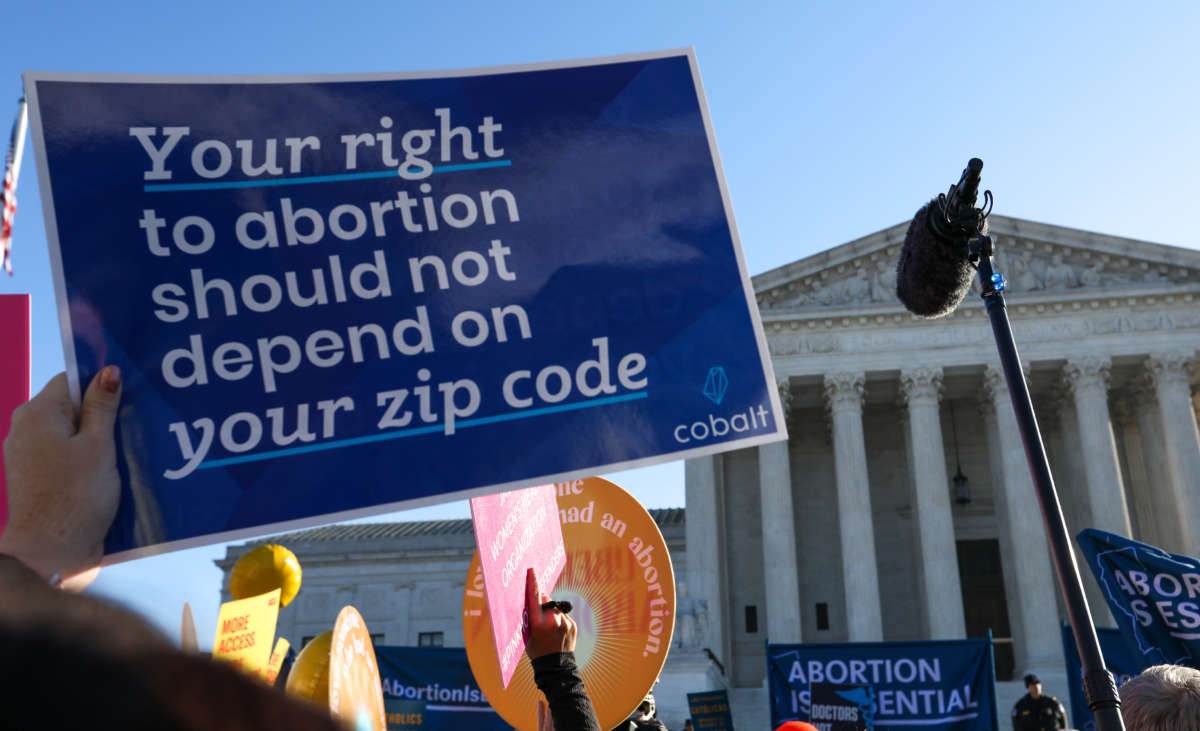Honest, paywall-free news is rare. Please support our boldly independent journalism with a donation of any size.
If the Supreme Court overturns Roe v. Wade, as it could very well do next year, the average American will have to travel about 125 miles or more — or about 250 miles round-trip — to access the closest abortion provider, according to data from the Myers Abortion Facility database that was first reported by Axios.
Currently, with Roe v. Wade still in place, people only have to travel 25 miles on average for abortion access. Overturning Roe will nearly immediately quintuple that distance, forcing people who are seeking an abortion to face further restrictions and hardship.
The gutting of Roe v. Wade appeared to creep closer on Wednesday. In hearing arguments for a case brought by Mississippi seeking to uphold a law that bans abortions after 15 weeks of pregnancy, the Supreme Court indicated that it may be prepared to rule in the state’s favor. This cruel and draconian ruling would effectively overturn the Roe v. Wade decision that has protected abortion rights in the country since 1973.
According to the Guttmacher Institute, there are 26 states that are likely or certain to ban abortion as soon as Roe is no longer in place. The Myers Abortion Facility based its findings off of data from the Center for Reproductive Rights, which similarly finds 27 states and territories that are hostile toward abortion rights.
The database also finds that the portion of people living over 200 miles away from the nearest abortion clinic would increase dramatically, from 1 to 29 percent.
With such an enormous hurdle in the way of reaching a provider, many people would be unable to access a safe abortion at all. A myriad of factors can play into this — someone may not have access to transportation out of state, or may not be able to afford gas and other travel expenses on top of sometimes already sky-high costs for an abortion itself. Others may not be able to get time off of work to take a trip for the procedure.
In other words, overturning Roe would have devastating, dangerous and wide-reaching consequences for Americans across the country, millions of whom are struggling to get by even without another child to take care of. If only more affluent people are able to afford safe abortions, inequality will increase even further — and without widespread abortion access, many people may die.
Prior to the passage of Roe v. Wade in 1973, hundreds of people died each year due to the lack of abortion access — a death rate that physicians warn may return if the Supreme Court rules in the state’s favor in the Mississippi. There’s also the potential that people who are pregnant due to rape or incest may die by suicide when forced to carry a constant reminder of their abuse.
Democrats in Washington don’t have to allow this to happen. In response to the abortion law, progressive lawmakers have been calling for expanding the number of seats in the Supreme Court. Because Republicans manipulated Congress and the presidency to pack the court full of conservative justices, progressives point out, court expansion may be an important avenue for Congress to protect abortion rights and other key rights moving forward. The legislation to expand the court has already been filed; Democrats, who are in charge of the House and the Senate, only need to take it to a vote.
The party could also pursue legislation that would enshrine abortion rights into law, circumventing any potential Supreme Court decisions entirely. In fact, shortly after Texas’s near-total abortion ban went into effect, House Speaker Nancy Pelosi (D-California) promised that Congress would take action to do so. But the bill only passed the House and never saw movement in the Senate — though the pro-choice movement may face staunch opposition from conservatives in the chamber.
Abortion advocates have pointed out that the government could also circumvent bans by removing restrictions on the abortion pill mifepristone and allowing it to be purchased over the counter. The pill is currently under strict restrictions from the Food and Drug Administration (FDA), which only allows patients to access it through certain providers.
Barring the passage of legislation or action from the FDA, Democrats have an option to protect abortion rights that doesn’t involve a vote at all; as Ryan Cooper points out for The Week, President Joe Biden could simply ignore the Supreme Court decision entirely. The U.S.’s founding documents don’t explicitly hold judicial review as binding, meaning that the president could declare Supreme Court rulings as merely advisory instead.
This would be a rather extreme step that would likely face resistance from many Democrats — but Democratic leaders have the power to recognize that the issue at stake is worth bucking traditionalism for.
Media that fights fascism
Truthout is funded almost entirely by readers — that’s why we can speak truth to power and cut against the mainstream narrative. But independent journalists at Truthout face mounting political repression under Trump.
We rely on your support to survive McCarthyist censorship. Please make a tax-deductible one-time or monthly donation.
